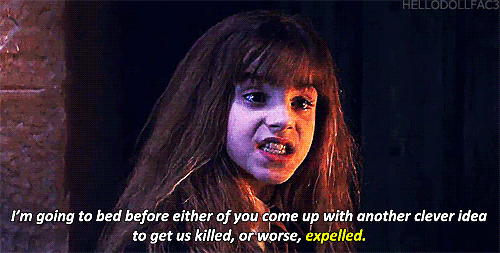Hermione Granger and the Myth of Having It All Together: A Therapist's Reflection on Perfectionism and Burnout
Obligatory disclaimer: I grew up with the Harry Potter books and still find meaning in the stories and characters—but I want to acknowledge that I do not support or share many of J.K. Rowling’s public views, especially those that harm the LGBTQ+ community. This post is about connecting with the emotional themes in the Harry Potter universe, which many readers still cherish and relate to deeply.
You probably know someone like Hermione Granger—maybe you are someone like Hermione. Driven, responsible, always the one who double-checks the details, keeps everyone else on track, and somehow juggles everything with a fierce sense of purpose.
But under Hermione’s confident, high-achieving surface is something many of us can relate to: perfectionism, over-functioning, and the quiet, chronic weight of emotional burnout.
As a therapist, I often work with clients who feel like they’re barely holding it together while appearing to the outside world as though they’ve got it all figured out. If this sounds familiar, you’re not alone—and you're definitely not failing. You may just be stuck in the Hermione trap.
🎓 When “Being the Smart One” Comes at a Cost
Hermione is often praised as the brains of the trio—and rightfully so. She’s brilliant, resourceful, and courageous in her own right. (Let’s be real—Harry never would have made it without her.) But it’s worth noting that she also:
Puts immense pressure on herself to get perfect grades
Takes on more than her fair share of the emotional and logistical labor
Struggles to rest, delegate, or allow herself to be vulnerable
Sound familiar?
For many people—especially women, gifted students, and adult children from chaotic or high-pressure households—this kind of behavior starts young. The message we get is clear: your worth is in your performance.
What begins as ambition or helpfulness slowly morphs into over-functioning: managing others’ needs, fixing every problem, avoiding mistakes at all costs—and losing yourself in the process.
🚩 Signs You’re Over-Functioning Like Hermione
Here are a few signs you might be trapped in this cycle:
You feel responsible for keeping everything (and everyone) together
You say yes when you're already stretched too thin
You over-prepare or overthink decisions, fearing failure or judgment
You rarely ask for help—even when you really need it
You secretly feel exhausted, anxious, or resentful... but keep pushing forward
This isn’t just about “being type A.” It’s about a pattern of self-worth tied to doing, helping, and achieving, with very little space left for being, resting, or receiving.
🔥 The Burnout Behind the Brilliance
What we don’t often see in Hermione (or what we only catch glimpses of) is the emotional toll this takes. She’s juggling a full academic load and saving the wizarding world. She starts using a Time-Turner just to fit it all in. Eventually, something has to give.
Real-life burnout often looks less like collapse and more like:
Brain fog, trouble concentrating, and irritability
Trouble sleeping or relaxing even when you're exhausted
Losing motivation for things that used to bring joy
Feeling disconnected from yourself and others
Physical symptoms like tension, headaches, or GI issues
Burnout isn’t a personal failure. It’s often a natural outcome of chronic over-responsibility and perfectionism—especially when those patterns go unchallenged for years.
💬 “But If I Stop, Everything Falls Apart”
One of the hardest parts of healing from perfectionism and over-functioning is untangling your worth from your productivity. For many clients, the fear is: If I stop doing all the things, people will be disappointed… or I’ll fall behind… or I won’t be enough.
These are valid fears, often rooted in lived experience.
But therapy offers a space to gently explore those beliefs:
Where did you learn them?
What would it mean to set a boundary?
What if asking for help was a strength, not a weakness?
What do you actually need?
Healing doesn’t mean abandoning your drive or your intelligence. It means reclaiming your right to rest, to be supported, and to show up as a whole human—not just the “capable one.”
🛠 Tools for the Hermione in You
If you recognize yourself in this, here are a few small, powerful steps you can take:
Practice saying “That’s enough.” You don’t have to do it all to be valuable.
Notice your self-talk. Is it kind? Is it pressure-filled? Would you say it to a friend?
Let something be imperfect. Not every email needs to be polished. Not every to-do needs to be done today.
Ask for help—even if it feels hard. It’s okay to lean on others. You don’t have to carry everything alone.
Explore your story in therapy. Together, we can unpack where these patterns started and how to gently shift them.
🌱 You Don’t Have to Be the One Holding It All Together Anymore
You are not broken. You are not failing. You’ve just been trying to survive in a world that praises overwork and perfectionism—and therapy can help you find a gentler, more sustainable way forward.
Whether you’re a full-on Hermione or just see glimpses of her in yourself, you deserve to feel grounded, cared for, and enough—even when you’re not doing everything for everyone.
If you're ready to stop white-knuckling your way through burnout and start healing the pressure to be perfect, I'm here to help. Learn more about my therapy services here.
Related Articles: Chosen Family, Identity, and Belonging: What "Harry Potter" Teaches Us About Adoption
Why We Cry Over Fictional Deaths: The Science of Emotional Attachment in Fandom
Supernatural: The Power of Fandom for Mental Health
Dating in Stars Hollow: What Gilmore Girls Teaches Us About Healthy (and Unhealthy) Relationships




